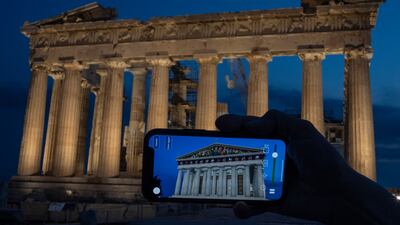An app is giving visitors to the Acropolis a peek at what the ancient Greek site would have looked like in its prime.
The app, named Chronos after the Greek word for time and the leader of the mythological Titans, has been developed by Greek telecoms provider Cosmote and supported by the country’s Culture Ministry. It uses augmented reality to superimpose a digital image that shows how the site may have looked 2,500 years ago.
The technology provides interesting insights into the history of the Acropolis and its ancient buildings. The app works on the famous Parthenon temple, the adjacent Roman theatre and parts of the Acropolis Museum.

With the app, Parthenon’s collection of marble sculptures, removed two centuries ago and on display at London’s British Museum, reprise their places along the edifice. Greece has urged the British Museum to return the sculptures.
Chronos also manifests the sculptures with their vibrant paints that have long flaked off. The statue of the goddess Athena, meanwhile, is shown in the main chamber of the Parthenon standing over a shallow pool of water.
"That's really impressive ... the only time I've seen that kind of technology before is at the dentist," said Shriya Parsotam Chitnavis, a tourist from London.
“I didn't know much about the [Acropolis], and I had to be convinced to come up here. Seeing this has made it more interesting – seeing it in colour,” she said. “I'm more of a visual person, so this being interactive really helped me appreciate it.”

While Chronos is best experienced at the Acropolis, it also works away from the site.
“Accessibility is extending to the digital space,” Lina Mendoni, the culture minister of Greece, said at a preview launch event for the Chronos app in May. “Real visitors and virtual visitors anywhere around the world can share historical knowledge.”
Designers said they will continue building on the free app, which boasts features such as an artificial intelligence-powered virtual guide.
“As technologies and networks advance, with better bandwidth and lower latencies, mobile devices will be able to download even higher-quality content,” Panayiotis Gabrielides, a senior official at Cosmote, said.
With additional reporting from agencies


